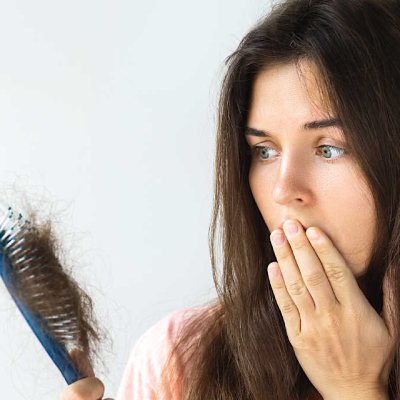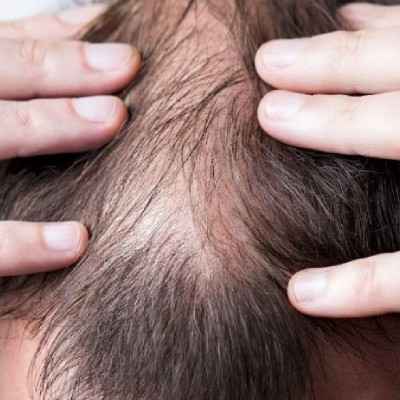Scalp Infection: Causes, Signs, and Treatment

20 March 2022

Hair Experts @ AHS

A healthy scalp is a foundation for beautiful hair. Yeast or fungal infections on the scalp, for example, can cause damage to the hair if left untreated. Because of this, it's crucial to take proper care of your scalp as part of your daily skincare regimen. Find out how to care for your scalp, prevent infections, and which products to use for a healthy scalp.
A healthy scalp is a foundation for beautiful hair. Yeast or fungal infections on the scalp, for example, can cause damage to the hair if left untreated. Because of this, it's crucial to take proper care of your scalp as part of your daily skincare regimen. Find out how to care for your scalp, prevent infections, and which products to use for a healthy scalp.
According to the Hair Loss Association, 85% of men and 40% of women lose their hair by 50. Fortunately, a wide range of hair restoration products is now available. Scalp micro pigmentation is one of the most common hair loss treatments. Scalp treatment cost is generally borne by people suffering from hair loss, also known as alopecia.
What is Scalp Infection?
Scalp infection treatments are just as common as skin infection treatments. The top layer of skin on the skull is the "scalp," which is more susceptible to infection than skin elsewhere on the body. When it comes to making the scalp more vulnerable to infections, the existence of overactive sebaceous or oil glands is one of many contributing factors. Others include having unwashed hair that collects dirt and sweat and using harsh hair treatments for aesthetic purposes.
Viruses can also cause infections on the scalp. Even though scalp infections are typical, they represent no severe damage to an individual's general health. Bacterial or fungal infections of the scalp may result in head sores and hair loss. Infected individuals are affected by the psychological effects of the disease's physical manifestations as well.
Also Read : Some Not-to-Miss Scalp Infections Which Causes Hair LossCauses of Scalp Yeast Infection
Candida thrives in warm, wet environments, but a yeast infection of the scalp can occur even if these conditions are not present. Your skin's natural environment can be out of whack at times resulting in poor scalp conditions, which could include:
- A poor eating plan
- Stress
- Certain pharmaceuticals
- Some personal care products that contain harsh chemicals.
The fungus can penetrate the surface of your scalp through minor wounds. Any or all of these causes can aid Candida's growth.
In most cases, therapy is effective in curing a scalp infection treatment. When Candida spreads to other parts of the body, it can create more severe health issues and affect:
- Eyes
- Mouth
- Stomach and duodenum
- Bloodstream
- Bones
- Organs of the body
Candidiasis risk factors include:
- Reduced resistance to infection
- Diabetes
- Hypothyroidism
- Disease states that cause inflammation
- Birth control, antibiotics, or corticosteroids
- Psoriasis and other skin diseases
- Being under the age of five or over the age of fifty-five
Signs of Scalp Infection
If you see any of these scalp infection symptoms, you may have to consult a dermatologist and get it checked.
One or more of the following may happen to you if you have a scalp infection:
- Rashes, cracks, or patches of skin that are red or purple or shedding of white, flaky scales
- Soft, moist, and white patches of skin
- Pimples with white pus-filled centres
Candida also spreads to other parts of the body, and these symptoms include:
- Fatigue
- Constipation
- Inflammation of the urine or genital tract
- A throbbing sensation in the nose
In some cases, scalp infection symptoms and indicators are identical to those of other illnesses.
How Scalp Infection causes Hair Loss

Infections are a possible cause of hair loss. Because they resemble dandruff, many people are misled into thinking that they are dealing with something else entirely. These can lead to hair loss in several ways and the development of bumps on the scalp. Look at a few of these illnesses in the following paragraphs.
- Folliculitis: Inflamed hair follicles are the hallmark of this disorder. The ailment is generally caused by bacteria, although certain non-infectious kinds are caused by oiliness and greasiness of the scalp as well. Acne-like rings encircle the opening of the hair follicle, resembling acne. Hair loss may appear in patches as a result of the disorder.
- Dermatitis Seborrhoeic: Many body regions can be affected by it, and it is highly prevalent. Stress, hormone imbalance, and traumatic brain damage are a few possible causes. There is a higher incidence of seborrheic dermatitis in Caucasians due to a genetic link. Oily and irritated skin may hurt when it comes into contact.
- Ringworm: Ringworms have nothing to do with this fungus. When it occurs on the scalp, hair is lost in clumps. Itchy, red, and inflamed areas are common symptoms. Ringworm causes hair to become brittle and dry, making it easy to break. Variations in the infection can go away on their own or necessitate the administration of medications to cure them.
- Demodex Folliculorum: a Parasite: Hair follicles and skin harbour these microscopic worm-like creatures, which feed on the dead skin cells and sebum secreted by the scalp. However, contrary to popular belief, they do not promote hair loss but can irritate the skin. Eyelashes are particularly vulnerable to these issues.
- Piedra: The hair fibres become infected with fungus as a result of this disorder. There is an evident sign of Piedra in the shape of hard nodules on the hair. Based on the colour of the nodules that grow on the hair, the ailment is further subdivided into black piedra and white piedra. Medicated creams are applied to the afflicted areas of the scalp during the procedure. Besides the scalp, other body regions might also be affected by the hair-loss-inducing effects of piedra.
Treatments for Scalp Infection
Treatments for most scalp infections are available over-the-counter (OTC), as various ointments, shampoos and foams are readily available to treat them.
According to a reliable source, fluconazole (Diflucan) and other azole antifungal medicines and allylamines have shown great promise in clinical trials. Topical antifungals like these have a success rate of 80 to 100% when used in combination to treat Candida.
Antifungal ointments, shampoos, and foams can be purchased online. Any drug you buy should have one of these active ingredients:
- Ketoconazole
- Clotrimazole
- Econazole
- Oxiconazole
- Miconazole
- Naftifine
- Terbinafine
Your pharmacist can prescribe cortisone foam if OTC antifungals haven't cleaned up the infection. Your doctor may also prescribe nystatin or amphotericin B.
Treatments that can be Done at Home
Scalp infection treatment can be initiated with natural remedies. There is still a lot of work to be done to determine whether or not they are effective. Here are a few suggestions for natural cures:
- Apple cider vinegar can help remove dead skin and relieve inflammation by diluting it with water.
- Coconut oil may have antifungal qualities, according to some studies. You can use 12 drops per 1/4 cup of essential oil or use it all by itself. Coconut oil can be purchased online or over the counter.
- Yeast infections on the scalp could benefit from antibacterial characteristics in essential oils. The following essential oils are worth trying: lavender oil, tea tree oil, and lemongrass oil. Essential oils can be purchased online.
As Soon as Possible, Follow the Doctor's Recommendations
Untreated fungal infections of the scalp, particularly candida infections, can cause many unpleasant symptoms and problems, such as hair loss or damage.
According to experts, an infection on the scalp can cause hair loss if left untreated. It can spread to your eyes, mouth, and bloodstream if you have yeast on your scalp. This can cause severe sickness."
Doctors warn that "hair loss, subsequent bacterial infection, unattractive peeling and incessant itching are all conceivable." It may be necessary for your dermatologist to prescribe more robust choices at this time."
Concerned about a scalp yeast infection or unexpected hair loss? Consult your dermatologist or your skin doctor right away for expert medical guidance. Your typical hair scalp treatment care regimen could need some tweaking during this time.
- Prevention is Better Than Cure: Pay special attention to how you take care of your skin, hair, and scalp. Your skin is the most significant organ in your body; therefore, it is critical how you care for it.As for any chronic scalp itches, take the necessary steps. Take care of your scalp and hair by incorporating hair wellness products tailored to your specific needs into your daily routine. A healthy diet, proper hygiene, and avoiding abuse of antibiotics and steroids are all encouraged by doctors. Here are a few more ideas for maintaining a healthy scalp:
- Scalp Your Body Every Week for a Detox:Once a week, use Scalp Detoxifying Treatment to give your scalp some tender loving care. Think of it as a deep clean that also has exfoliating properties. In addition to removing stubborn scalp build-up, serums heal skin damage and alleviate discomfort.
- Self-Care for Your Hair & Scalp: According to doctors, well-balanced acidic skin chemistry can help prevent yeast from thriving. Proper scalp care and regular scalp and hair maintenance practices are good places to start the fight against scalp fungus.
- Wash Your Hair and Scalp Correctly: Doctors recommend using pyrithione zinc-containing shampoos to help exfoliate dandruff flakes and limit yeast growth. Hair can become dry or damaged if treated with harsh or incorrect products.
- Bring Your System Back to Balance by Using Your Innate Wisdom: First innovative hair care system with intuitive technology that adjusts to the hair on contact to offer optimal levels of hydration and volume and colour and shine enhancement while boosting colour and shine.
- A Holistic Approach to Hair and Scalp Health: A holistic approach is the most excellent way to ensure a healthy or rewarding hair scalp treatment.Additionally, you should eat a healthy diet, drink plenty of water, practice excellent hygiene, exercise regularly, and check your stress levels to keep your scalp, skin, and hair healthy.A balanced scalp and hair that appears and feels more healthy, shiny, and strong will result from an internal, holistic approach to wellness.
Conclusion
Yeast on the scalp is defined by an imbalance in the skin's flora produced by an overgrowth of yeast, such as Candida or Malassezia, on the scalp, which is characterised by a greasy appearance. If you suspect that you have yeast on your scalp, consult with a healthcare professional. The scalp hair treatment for a yeast infection can be accomplished with various over-the-counter shampoos and prescription drugs.
Stay Updated
Subscribe to our email newsletter for helpful tips and valuable resourses
Be an influencer
Join forces with Advanced Hair Studio! Explore exciting collaboration opportunities tailored for influencers. Let's redefine haircare together.
Connect now












